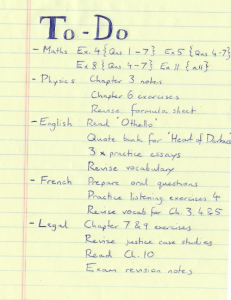With the end of term rapidly approaching, you’ll probably notice your more malicious teachers start to pile on the homework for the upcoming school holidays over the next few days. It may seem cruel and unusual punishment now, but you’ll probably thank them one day. Probably.
Until then, it’s up to you to make the most of your school holidays by prioritising what needs to be done in preparation for next term, and, let’s be honest, catching up on everything you should’ve done last term.
For most students, the degree of preparation varies greatly. Some will blindly head into the school holidays with no idea of how much needs to be done, and will just whittle away at tasks when they’ve got free time. Others will plan out every hour for the next fortnight to maximise efficiency and get a ridiculous amount of work done.
And neither of those are very effective plans.
What are the school holidays for?
For starters, you shouldn’t treat this break as even more intensive work session – your school has given you time-off for a reason, so at the very least, you should take a few days to put your study to the side and just chill out. Be with your family and friends, watch a movie, work out, binge watch some telly, and assure yourself that taking some time away from your textbooks isn’t going to make or break your ATAR. On the contrary, students who feel the need to pack in hours of study every single day are more likely to be the ones studying inefficiently or even burning out prior to exams, whereas those with a more balanced approach who take care of their mental health as well as their grades will be in a far better position at the end of the year.
But you also don’t want to get too lackadaisical. If you neglect to cover your assigned homework over the break, then you’ll already be at a disadvantage heading into next term. And if you delay starting on anything until the last few days, you’ll be in for a pretty rough time. It’d be far better to get the work out of the way and give yourself a truly enjoyable and justifiable break than to spend the first week stressfully trying to watch Netflix while your stack of books looms in the corner of your room reminding you of all that responsibility you’re avoiding.
So how can you tread this fine line between underloading and overloading? Well, the method I’d wholeheartedly recommend involves two simple lists: a to-do list, and (more importantly!) a must-do list.
To-do lists
A to-do list is pretty straightforward. Go through each of your subjects and list all the tasks or revision exercises that you need to complete. Some of this will consist of work assigned to you by your teacher, but you may also want to include more optional or self-assigned work like compiling exam revision notes or going back over textbook exercises you didn’t grasp the first time. You could even include preparation exercises or pre-reading to help you get a head start for next term.
Once you’re done, you should have a pretty conclusive list of everything that you want to complete. What’s more, you’ll be able to gauge just how busy you’ll be. If you’ve identified numerous time-consuming tasks, then it’s quite likely that you’ll need to set aside a solid few days to working through them, but if your list consists of less demanding tasks, then you can afford to relax a little more. Things like reading ahead or revising your own notes are pretty chill activities, and many exercises won’t take more than an hour or two. Consider the length of your to-do list, and you’ll be able to estimate just how much time you’ll need to devote to your studies over the next couple of weeks.
But the trouble with relying solely on to-do lists is that there’s no accountability. It gives you very little direction from day-to-day, and it can even be kind of demotivational to see a long checklist of stuff you haven’t done yet. That’s why combining a to-do list with a must-do list is so beneficial.
Must-do lists
What are these? Well, the clue’s in the name. A must-do list is more deadline driven with the emphasis on when certain tasks need to be completed. How you structure this is up to you – maybe you have a heap of work that’s due on the first day back after the school holidays, so you can prioritise those tasks. But the most effective kind of must-do list involves self-imposed deadlines! What this means is that next to every task, you write the day by which that piece of work MUST be finished. It doesn’t matter if these limits are a bit arbitrary – just try and distribute them across the break in a way that makes sense to you.
Some people favour having three or four days at the start of the school holidays when they’ll go all-out and work for six or seven hours. That way, they finish the bulk of the work really early and give themselves more time to relax afterwards. For others, though, it might make more sense to spread out the work so that you do the revision exercises early and leave the preparation for next term towards the end.
Whatever the case may be, you need to follow one rule: be realistic! Don’t pile a heap of work on yourself and say that all of it MUST be done within 48 hours. You’ll only stress yourself out. Instead, space things out based on what you know of your own preferred study patterns. Do you find it difficult to shift between different subjects? Then don’t give a Maths exercise and an English practice essay the same mock due date. Do you have to be in a certain ‘mood’ to do certain subjects? Then put those due dates towards the end of the break so you can find the right time to complete those tasks.
Note that the dates you write down aren’t set in stone like the VCAA exam dates. If something unexpected happens, or you’re simply too tired to attempt work, you can be a little flexible. Just don’t keep postponing things because you’d rather do something else.
You should also note that the day something is ‘due’ isn’t necessarily the day you have to complete the task. Sure, the end of April 7th might be your self-imposed deadline, but you might decide to do the work on April 1st. And it’s amazing how good it feels to be ahead of your own expectations. It’s a silly little placebo, but still a pretty effective one – finishing things long before you have to is hugely satisfying, and it makes you feel as though you’ve earned those ‘extra’ days of freedom.
And unlike the to-do list, your must-do list gives you a much clearer goal. Instead of just knowing that you have to complete a certain amount of work at some stage, a must-do list lets you know what to do and when. It’s not as restrictive as a day-by-day or hour-by-hour breakdown of how you’ll spend your school holidays, but it gives you enough structure to ensure you don’t waste time procrastinating or studying inefficiently.
The to-do list is an excellent starting point (since you don’t want to get so caught up in dates that you end up forgetting what needs to be done in the first place!) But turning this into a must-do list will make your study much more straightforward. So as you head into these school holidays, don’t get tied up in elaborate timetable spreadsheets or a mass of sticky note reminders. Instead, consolidate your tasks into these two easy checklists, and enjoy your break while it lasts!










Comments
No comments yet…